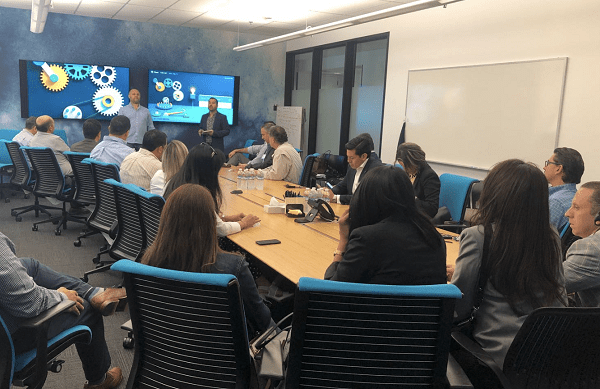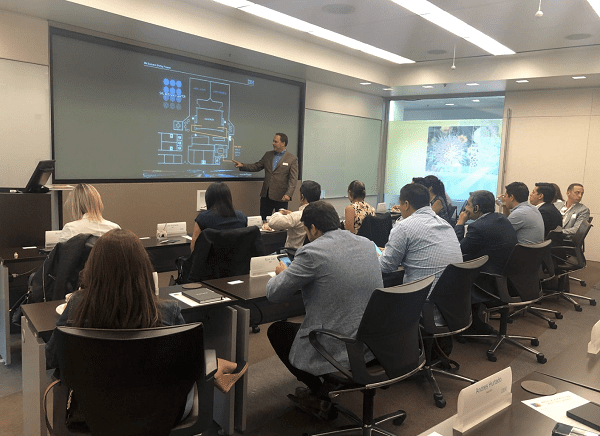Insurer BMI Ecuador has been in operation for more than two decades. The company knows its core business in health and life insurance well and has been successful in those industries since its founding in 1997. But now, in the face of a rapidly digitizing insurance sector, BMI risks losing ground to new entrants and agile competitors who are taking advantage of emerging technologies to offer superior products and services to consumers.
To better understand the risks it faces and learn how to overcome them, BMI turned to Silicon Valley Innovation Center. We built a customized two-day executive immersion program for BMI which focused on two areas: corporate innovation and the digital transformation of the insurance industry. In this article we cover key trends BMI were introduced to in each of these areas.

Corporate Innovation and Culture
Before an organization can embrace new technologies and be a truly digital business it must first create a compatible corporate culture. What does this culture look like? There is no definitive answer to that question but there are certain traits which are today held up as being essential to a corporation’s culture if that corporation is to not just survive but prosper. Namely:
Corporations must be agile, customer-centric learning organizations which encourage innovation and make data-driven decisions.
We took BMI’s executives to a Q&A session with Google so they could see how the tech giant seeks to realize these ideas in practice. The BMI team learned about Google’s policy of 20-percent-time, whereby employees are encouraged to spend 20 percent of their time pursuing innovative and creative side projects that could benefit Google. Google AdSense, Gmail, and Google News – all now significant parts of its core business – were first conceived as 20-percent-time side projects.
But Google is just one example of a company with an innovative corporate culture. There are many more in Silicon Valley, including Airbnb. At Airbnb, BMI’s executives heard how the sharing economy platform prides itself on what it refers to as its coaching culture. In practice this philosophy means Airbnb provides employees with regular feedback and strives to create an atmosphere conducive to learning and self-development. Airbnb credits this culture with helping the company adapt to a changing regulatory environment and diversify into new product lines.
Key takeaway from Google and Airbnb: corporate innovation can be achieved in many ways. No two organizations are alike, so no two corporate cultures should be alike either.

Executives from insurer BMI Ecuador learn about Google’s innovative corporate culture.
Digitization of Insurance
Establishing an innovation-ready corporate culture like that of Google or Airbnb is the first step toward organizational transformation. The next part of the journey is about engaging with the startups and technologies actively disrupting the status quo.
In the case of the insurance industry, disruption is being led by insurtechs. These companies are drawing upon data and emerging technologies to redefine how insurance is delivered to consumers.
One of the most prominent new business models in insurance is platformification, the creation of online ecosystems where producers and consumers can interact.
In insurance platformification Sureify is a leading player. At a meeting with the startup, the BMI executive team learned how the Sureify platform equips insurance carriers with digital customer engagement tools. These tools allow insurers to provide their customers with the kind of smooth user experience we have come to associate with leading digital services like Uber and Facebook.
“Life insurers and insurers in general really struggle to engage,” says Dustin Yoder, Sureify CEO. “About 97% of life insurance today is not sold online. Ultimately, insurance companies struggle to get to market digitally.”
The Sureify platform also collects a wealth of data on policyholders, including their life events, habits and health status. This data enables insurers to maximise revenue by personalizing the products they offer customers.
Sureify isn’t the only platform shaking up the insurance industry. During a startup showcase on the second day of their immersion program, we introduced the BMI delegation to biotechnology firm NeuroSky. NeuroSky’s biosensor technologies make it possible to collect more biometric data than ever before. For insurers, integrating this data into existing systems provides more information about customers; who they are, what they need and when they need it. For insurance consumers, more access to personal biometric data can lead to better-informed lifestyle decisions, better health outcomes and, with any luck, more affordable insurance premiums.
Key takeaway from Sureify and NeuroSky: data is now a company’s most valuable asset. The more a company can engage with its customers the more data it can collect. The more data it can collect, the more it can engage with its customers through personalized services which delight consumers and drive greater revenues.

As part of their two-day immersion program the BMI Ecuador team learned about disruptive trends emerging today in the insurance industry.
Risky business
In life as in business, circumstances change. While insurance companies might be able to offer their customers insurances against unplanned events, they cannot protect themselves against all possible scenarios in their industry.
But for BMI, what is within the company’s power is to avoid being disrupted by insurtech startups which offer digital products to today’s digital consumers. The insurer left Silicon Valley with a clear blueprint on how achieve that result. The first step on that blueprint is to develop a corporate culture robust enough to thrive in a constantly-changing landscape. Step two is to look outward, at consumers, at startups and at technology, and be willing to learn about how old problems can be solved in new ways and how new problems nobody has thought of yet can be solved in ways which have yet to be invented.
Yet although some trends cannot be predicted, what become obvious to BMI Ecuador’s executives during the course of their program is that insurtech is a threat and it is here to stay. But what the BMI team also saw is that there is a range of options at their disposal to grow in a way which turns fintech from a threat into an opportunity. Those options include partnering with startups, developing digital solutions in-house and ramping up corporate venture capital.
Whatever path BMI choose, what is now clear to its top leaders is that there is a need for action. In today’s disruption-centric economy, where doing nothing is the choice that carries the highest cost, it is that step to action which is the most important step of all.